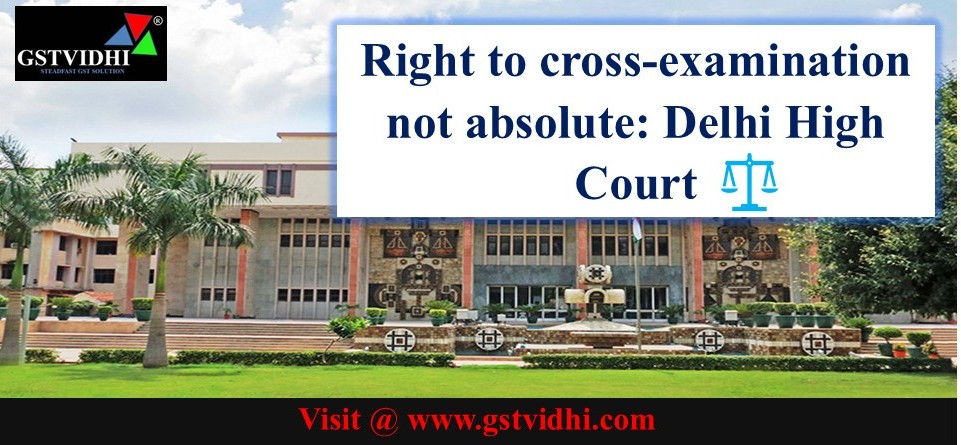
Right to cross-examination not absolute: Delhi High Court (M/s
Vallabh Textiles v. Additional Commissioner, CGST Delhi East & Ors. W.P.(C)
4576/2025)
Summary of
the Case
The Delhi High Court
dismissed the writ petition filed by M/s Vallabh Textiles, challenging a
demand order of ₹7.13 crore plus equivalent penalty, arising from
alleged undisclosed taxable sales made through “kaccha ledgers.” The
main grievance was the denial of cross-examination of witnesses whose
statements formed part of the Show Cause Notice (SCN).
While acknowledging that
cross-examination is relevant in some cases, the Court held that its denial
alone does not automatically invalidate adjudication. The Court emphasized
that factual issues and evidentiary disputes must be pursued before the statutory
appellate authority under Section 107 of the CGST Act, and hence directed
the petitioner to file an appeal within 30 days.
Case Snapshot
- Petitioner:
M/s Vallabh Textiles
- Respondents:
Additional Commissioner, Central Tax GST, Delhi East & Others
- Court:
Delhi High Court
- Order Date:
9 April 2025 (Corrected & Released on 15 April 2025)
Background
and Chronology
1. Search
and Investigation: The Directorate General of GST
Intelligence (DGGI) conducted a search at the premises of M/s Vallabh Textiles
and recovered kaccha ledgers and parchas suggesting undisclosed
outward supplies.
2. SCN
Issued (29 May 2024): A consolidated Show Cause Notice
(SCN) covering FYs 2017–18 to 2021–22 was issued based on recovered
evidence and statements of third parties.
3. Challenge
to Consolidated SCN: The petitioner previously filed W.P.(C)
13855/2024, challenging the consolidation of multiple years in one SCN.
The HC disposed of the plea on 3 October 2024, holding that consolidation
is not impermissible under the CGST Act.
4. Request
for Cross-Examination Denied (20 January 2025):
The petitioner later requested to cross-examine five third-party witnesses. The
Adjudicating Authority denied this request, citing lack of necessity,
since the evidence was corroborated by documents.
5. Final
Demand Order (29 January 2025): The Authority passed a 60-page
detailed order confirming demand of ₹7.13 crore and imposed equivalent
penalties under Section 74 of the CGST Act. Penalties were also imposed on directors.
6. Writ
Petition Filed (W.P.(C) 4576/2025): Instead of appealing,
the petitioner challenged both the denial of cross-examination and the final
demand order directly through a writ petition under Article 226.
Petitioner’s
Arguments
- The investigation and SCN proceedings
were flawed due to denial of cross-examination.
- Statements of key witnesses, such as Sh.
Vinod Baid, Sh. Kamal Kishore Karnani, Sh. Saurabh Aggarwal,
Sh. Deepak Kumar Jha, and Sh. Anil Kumar, were used without
allowing rebuttal.
- The impugned demand order was based
heavily on oral testimony unsupported by admissible evidence, and
hence was vitiated.
- The case involved violation of
natural justice, justifying interference under Article 226.
Respondent’s
Submissions
- The SCN and adjudication were lawful,
supported by documentary evidence and ledger entries seized from the
petitioner’s premises.
- Cross-examination is not an
unfettered right, especially when statements are
corroborative of undisputed documentary evidence.
- Cited Telangana High Court ruling
in Mohammed Muzzamil v. CBIC, where cross-examination was denied
due to the presence of corroborative documentary evidence.
- The petitioner’s grievance was appealable
under Section 107 of the CGST Act, and writ jurisdiction should not
be invoked at this stage.
Court’s
Observations
1. Scope of Judicial
Review Limited
The Court reiterated that
factual disputes and evidentiary evaluation are better left to the Appellate
Authority.
“Whether facts given by a
particular witness are right or wrong… cannot be considered in writ
jurisdiction.”
2. Cross-Examination Not
an Absolute Right
The Court analyzed legal
precedents and concluded:
- Cross-examination is governed by Section
138B of the CGST Act;
- It is not an inherent or absolute
right—especially when documents relied upon are undisputed;
- Reference was made to:
- Sushil Aggarwal v. Principal
Commissioner of Customs (DHC, 2025);
- M/s Telestar Travels v. Special
Director of Enforcement (SC, 2013);
- K.L. Tripathi v. SBI,
1984 (SC).
“Persons seeking
cross-examination ought to give specific reasons… Blanket requests cannot be
sustained.”
3. No Prejudice Shown
The Court agreed with the
Adjudicating Authority’s finding that the statements were merely
corroborative, and no substantial prejudice was shown due to denial
of cross-examination.
Final
Orders
1. Writ
Petition Dismissed: The Court declined to interfere with the
demand order or cross-examination rejection.
2. Appellate
Remedy Permitted: Petitioner was granted 30 days to
file an appeal under Section 107 of the CGST Act.
3. No
Objection on Limitation: If appeal is filed within 30 days,
it shall not be dismissed as time-barred.
4. Independent
Consideration Ordered: Appellate Authority to consider the
appeal on its own merits, without being influenced by HC observations.
5. All
Pending Applications Disposed Of
Conclusion
The judgment in Vallabh
Textiles v. CGST Delhi East reaffirms the Delhi High Court’s restrained
approach toward interfering with quasi-judicial tax orders via writ
petitions. While procedural rights like cross-examination remain protected in
principle, they are not absolute and must be weighed against documentary
evidence and factual context.
This case sends a strong
message that Article 226 should not be used as a shortcut to avoid
statutory appellate processes, and that writ remedies will not substitute
appeals, especially in high-stake GST assessments.
Disclaimer: All the Information is based on the notification, circular and order issued by the Govt. authority and judgement delivered by the court or the authority information is strictly for educational purposes and on the basis of our best understanding of laws & not binding on anyone.
Find the Attachment (Press on Click Here )
Click here